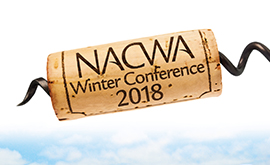Winter Conference Registration Open – Advance Your Advocacy!
 Registration is now open for NACWA’S 2018 Winter Conference—February 6 – 9, in Napa, CA— which will address some of the most profound issues confronting the clean water sector as utilities continue to deal with increasingly complex regulatory challenges and more stringent standards. With the theme, Exploring Net Environmental Benefit: Balancing Science & Cost, the agenda will include the following panel and roundtable discussions, tackling big advocacy issues at the intersection of science, policy and bottom line cost:
Registration is now open for NACWA’S 2018 Winter Conference—February 6 – 9, in Napa, CA— which will address some of the most profound issues confronting the clean water sector as utilities continue to deal with increasingly complex regulatory challenges and more stringent standards. With the theme, Exploring Net Environmental Benefit: Balancing Science & Cost, the agenda will include the following panel and roundtable discussions, tackling big advocacy issues at the intersection of science, policy and bottom line cost:
When Natural Disasters Strike – How Utilities Are Addressing Resiliency
Oftentimes natural disasters hit with very little warning. This year, multiple hurricanes took aim at the United States impacting the greater Houston area, the entire state of Florida, and twice slammed into Puerto Rico. As severe flooding consumed much of the southeast, rampant wildfires destroyed parts of northern California. Regardless of the political debate over climate science, ample evidence exists that communities should boost resiliency to protect against more frequent and powerful natural disasters. Roundtable participants will discuss their recent experiences and how clean water utilities can proactively address resiliency before disaster hits.
Who’s in the Driver’s Seat? Getting to Net Environmental Benefit
As municipal clean water utilities continue to face a “relentless incrementalism” of increasingly complex regulatory standards, can the Clean Water Act continue to ignore burgeoning costs? Does it make economic and ecological sense to continue to compel utilities to make significant financial investments to meet stringent water quality requirements if those investments do not translate into commensurate environmental improvement? Or should clean water agencies have the flexibility to make smarter investments that are more protective of public health and the environment and simultaneously maximize the return on their ratepayers’ investment? Roundtable participants will discuss these timely questions and how municipal clean water utilities may better consider the net environmental benefit of their actions.
Does Science Drive Policy or Policy Drive Science?
More than a year into the Trump Administration and the current Congress, concerns have been raised that policy is dictating science or that the science is being ignored. The Clean Water Rule’s perceived expansion of the definition of Waters of the United States is one recent example suggesting how the same science can be interpreted differently in today’s polarizing political landscape. A large number of scientists agree that climate change is real and happening. Yet, federal policies on climate change are currently lacking and fraught with opposition. This discussion will address the basics of how science and polity interact and the appropriate role for objective-based science in setting environmental policy.
Visit the conference website to see the full agenda and to register. The hotel registration deadline is January 15, so hurry and make your plans today!